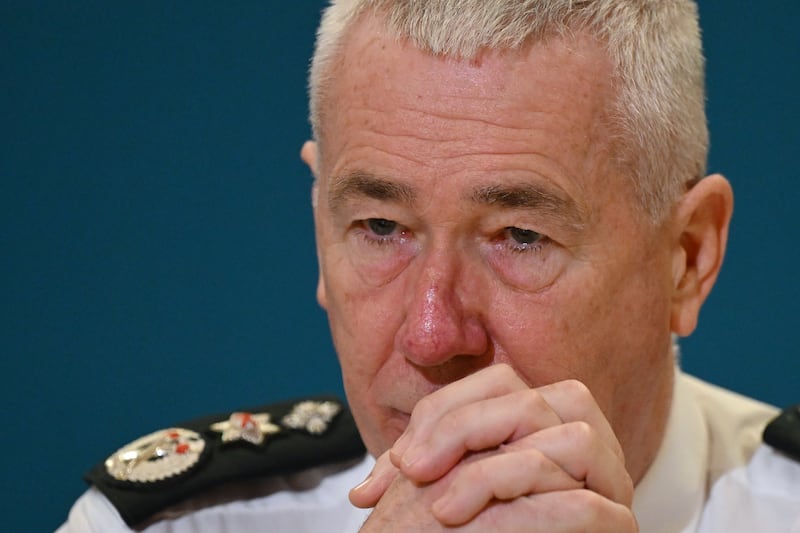St Paul's CBS Secondary School, on Brunswick Street in central Dublin, has been there since 1869. The original "School Around the Corner" from the classic RTÉ radio programme, it is known locally as the Brunner, and that's its semi-official designation on its website and Twitter page.
“When I put it out to staff and students they said, ‘It has to be the Brunner, sir,’” says the principal, Patrick McCormack.
Deis schools like the Brunner – Deis is the Department of Education’s scheme to improve equality of opportunity – have a lower pupil-teacher ratio, a home-school community-liaison teacher, and extra funding for books and school meals. St Paul’s received the highest possible score in its most recent Deis inspections. “I should have retired at that point,” McCormack says.
We're not a school that can rattle a bucket and pull in €30,000 from parent contributions. How can we look at our buildings and say they're good enough?
He asks 17-year-old Kian Fitzwilliam, who is in fifth year, to give me a tour and tell me about the school. (I also get help from a football-loving third year, Dylan O’Toole.)
Kian shows me the classrooms, the art room and the computer room, as well as some sculptures the caretaker made from abandoned car tyres. Nearby is a bike shelter funded by Dublin City Council after the students devised the project for
the One Good Idea competition.
Last year, he says, they had an event called November We Remember and had a memorial tree on which students put the names of friends and family who had died. Some people put up the name of the late rapper XXXTenacion, Kian says.
He shows me their excellent library, outside which a noticeboard displays all the books students have read and liked. He shows me the slightly cramped but brightly muralled yard and the old-fashioned leaking PE hall. “It puts a dampener on the rest of the school. It holds the school back from doing stuff.”
McCormack thinks below-par infrastructure shouldn’t be acceptable. “We’re not a school that can rattle a bucket at the gate and pull in €30,000 from parent contributions,” he says. “You look at our science labs, our PE hall and our yard... How can we look at those physical spaces and say that’s good enough for the kids in this school?”
Later he says that when a Minister facilitates grants “to refurbish hockey pitches in schools that aren’t in need of the cash, that’s very difficult to stomach”.
McCormack is very proud of his teachers and his students, and Kian is very proud of his school. “It’s described as a disadvantaged school, because of the area that it’s in, [but] everyone should go to a Deis school, because you get a lot of opportunities,” he says.
Kian lives in an apartment block nearby with his mother, who works at Tesco. She didn’t go to college, and he didn’t think about college much, either, until he came to the Brunner. McCormack says that when students are in first year the teachers ask who is interested in third level. “Only a smattering of hands go up, but by the end of sixth year most of them would be up.”
Kian wants to study aviation management at Dublin City University. He's fascinated by planes. He thought, for a while, that he'd like to be a paramedic. "I used to watch Casualty. But then I was in hospital. I realised I would not be able to reassure someone in a bad situation... I can't imagine giving someone an injection."
He says his teachers are excellent. He recently visited a grind school and saw some of them teaching there. “It makes you feel like maybe this is a better school to go to.”
Imagine me knocking on someone's doors trying to campaign on stuff. They'd just close the door on me. I'd probably close the door on me
He doesn’t think where you live should shape your destiny. “So what if your ma isn’t a doctor or a solicitor?” he says. “One of the good things about the educational system in Ireland is that your income isn’t going to define what you are in the future... We have a really good career-guidance teacher... The question isn’t ‘Are you going to college?’ but ‘What are you going to study?’”
What does he do in his spare time? “I watch people’s speeches in the Dáil. My mam is always asking me to put my headphones on, because every time she looks at me she hears Mary Lou McDonald” – the Sinn Féin leader – “in the background.”
He lists off local TDs and councillors and how engaged he feels they are in the community. Would he campaign for a party? He laughs. “Imagine me knocking on someone’s doors trying to campaign on stuff. They’d just close the door on me. I’d probably close the door on me.”
Is he looking forward to voting? “Definitely. Mary Lou McDonald, number one, straight away.”
Does he feel listened to? “I’m 17 now, but in 10 or 20 years I’ll be 27 or 37, and people will listen to me more. But young people are the people of the future. They should have an opinion... TDs should come in and stand at the top of the classroom and ask what young people think rather than knocking on people’s doors to ask what the adults think.”


















